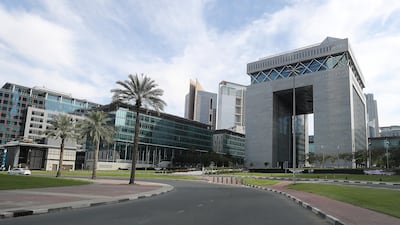The Dubai Financial Services Authority (DFSA), regulator of Dubai’s onshore financial hub, on Tuesday rolled out new standards facilitating the listing of small and medium-sized enterprises on capital markets in the Dubai International Financial Centre, a move that will open up a new avenue of financing for smaller businesses in the country.
An SME listing regime was launched on April 1, which allows smaller companies to raise funds through capital markets by “issuing shares, listing on the DFSA Official List of Securities and admitting them to trading on an 'authorised market institution' in the DIFC, the DFSA said on its website on Tuesday.
It did not say when it expects SMEs to start trading, or on which exchange they would trade in the financial centre.
SMEs account for more than 99 per cent of businesses in Dubai, providing 51 per cent of the emirate's jobs and 46 per cent of its gross domestic product, according to a study last year by Dubai SME, part of the Dubai government's Department of Economic Development. However, they often struggle to gain funding from banks, with 60-65 per cent of applications for short-term funding rejected,. Those that manage to get funding have to pay very high interest rates of between 14-24 per cent.
“With the listing regime for SMEs, the DFSA encourages market participants to develop financing solutions to bridge this gap,” it said.
The move aligns with Dubai’s new economy initiative launched in January by Sheikh Mohammed bin Rashid, Vice President and Ruler of Dubai, which set out proposals for a new exchange under the umbrella of the DIFC. A bourse dedicated to future economy companies will allow them to raise capital in “a more flexible system”, official news agency Wam said in a January 14 statement.
The new exchange was announced under a series of new measures that included a new Dubai Future District connecting the DIFC, Emirates Towers and Dubai World Trade Centre as well as a Dh1 billion Future Economy fund and an Office of Future Economy companies offering special five-year residency visas to entrepreneurs, as well as licenses for innovative projects, flexible work spaces and other assistance such as workshops and legal advice.
The DFSA on Tuesday said companies whose listed shares are valued at less than $250 million can be admitted to an exchange as an SME. They will cease being classed as one if the average aggregate market value of their listed shares exceeds $500m for 90 consecutive days.
“The main difference in terms of the DFSA rules applicable to it [the company that ceases to be SME] will be that the requirement for SME-tailored website disclosures falls away and the manner in which its annual fee is calculated will change,” DFSA said.
Companies only need to provide audited accounts covering one year to list as an SME, compared with three years for a standard listing. Owners listing shares generally need to agree to a lock-up period of 12 months before they sell further shares.


